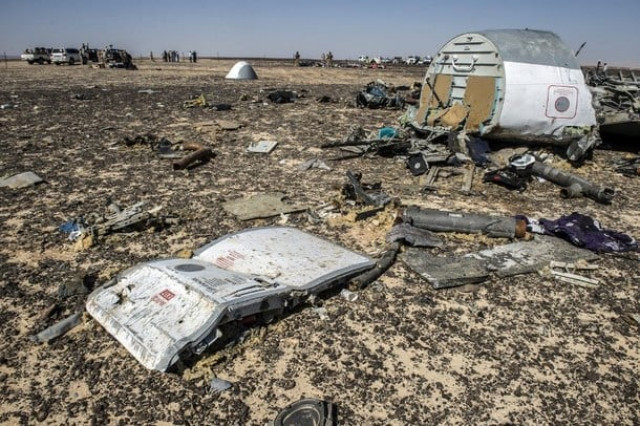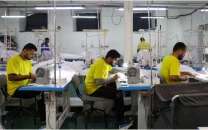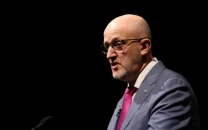Russia sees possible 'terror' link in Egypt jet crash
Britain and the US, as well as international investigators, suspect a bomb exploded on board the Metrojet A-321 plane

Debris belonging to the A321 Russian airliner areseen at the site of the crash in Wadi el-Zolmat, a mountainous area in Egypt's Sinai Peninsula on November 1, 2015. PHOTO: AFP
Britain and the United States, as well as international investigators, suspect a bomb exploded on board the Metrojet A-321 plane, but Egyptian officials insist there is no evidence yet of an attack on the aircraft which militants claim to have downed.
Egypt says no theory yet in Russian plane crash probe
Russia had also previously refrained from blaming the crash, which killed all 224 people on board, on terrorists until Prime Minister Dmitry Medvedev's admission.
"The possibility of an act of terror is of course there as the reason for what happened," Medvedev said in an interview with Rossiyskaya Gazeta state newspaper.
A growing international chorus has backed the theory that the plane was downed in an attack, with British Foreign Minister Philip Hammond saying Monday it was "more likely than not" that the plane was downed by an "explosive device placed on board".
Black box confirms ‘violent, sudden’ demise of Russian plane: source
On Monday, Israel -- which has strong intelligence links to neighbouring Sinai where the Airbus came down while en route from Egypt's resort of Sharm el-Sheikh to Saint Petersburg -- joined in.
"There is a strong probability that this is an attack," Defence Minister Moshe Yaalon told Israeli reporters on Monday.
And Airbus chief Fabrice Bregier said no technical fault has yet been detected for the crash of the A-321.
"I can say that so far, what we got from the investigation didn't trigger any action, technical action on our side, regarding the A-321 fleet," said Bregier.
"But we need to wait for the conclusion of the investigations."
Sources close to the probe have told AFP that experts involved in the investigation, with the exception of the Egyptians, "strongly favour" the theory of a bomb on board.
Islamic State claims responsibility for Russian plane crash in Egypt
Egypt has pushed back against mounting international concerns that a bomb brought down the plane, with Foreign Minister Sameh Shoukry saying it was too early to form a "hypothesis".
Amid the tourist exodus from Egypt, a senior operative of the Islamic State militant group, Ashraf Ali Ali Hassanein al-Gharabli, was shot dead in an exchange of fire in Cairo after police tried to arrest him, the interior ministry said.
The IS group's branch in the Sinai claimed responsibility after the Russian plane crash.
Egypt crash to spur demand for strict aviation security: Emirates
IS said it downed the plane in retaliation for Russian air strikes in Syria, but has not said how.
The IS affiliate in Egypt is waging a bloody insurgency in north Sinai that has killed hundreds of policemen and soldiers.
Meanwhile, tens of thousands of foreign tourists, including some 80,000 Russians and 20,000 Britons, were stranded in Egypt after flights were cancelled over security fears.
Russian President Vladimir Putin on Friday suspended all flights to Egypt.
Moscow said Monday that about 25,000 Russian tourists had so far returned on more than 100 flights, while London said some 5,000 Britons had returned home.
No proof that plane broke up in mid-air – Egyptian authorities
Hammond said he hoped flights to Sharm could resume soon, once "robust" security arrangements are in place.
Flight numbers have been limited because both Russia and Britain have banned tourists from bringing their check-in luggage, which will be flown home separately.
That restriction has prompted Egypt to limit the number of daily repatriation flights because it says there is only so much baggage its airports can accommodate.
The crash has led to calls for greater security at airports in regions near where terrorists operate.
It has also raised fears for Egypt's vital tourism industry, which had already been suffering from years of unrest.
Local tourism chiefs insist, however, that Sharm is secure.
"Sharm is safe. There is no problem inside Sharm el-Sheikh," said Givara el-Gafy, head of the south Sinai tourism chamber.



















COMMENTS
Comments are moderated and generally will be posted if they are on-topic and not abusive.
For more information, please see our Comments FAQ